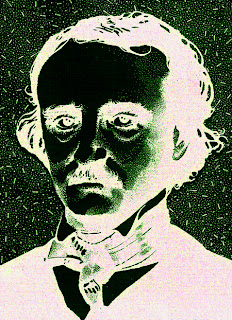"THE PSYCHOTIC HERO"
You may have heard stories of schizophrenics or some such individuals, such as Daniel Johnston, who have at times come to believe that they "are" Jesus, or "are" the Devil. This may be, I wonder, because they struggle to dissociate their subjective experience of life from the world in a normal way. Maybe they come to understand themselves as pure forms of supernatural paragons because the only way to dissociate enough to so eat and defecate is to dissociate radically.
The psycho, too, wishes like the rest of us to not harbor delusions. But his credulousness is a reversal. It is the mundane first that he suspects is a delusion, or illusion. He thinks: if the reality of my soul is false, then the natural and physically sensed is therefore false. By contrast, the cool-headed epistemologist starts with the natural as his first assumption.
So the questions upon which a normal man deliberates and ponders are the assumptions of the madman, and his world-view and behavior rest upon faith. If at any time he is uncertain of his supernatural essence, he cannot function. He is reluctant to eat, even; he wonders if his food is a dangerous and corrupting drug.
In other words, it's as if a madman believes that he could deduce the laws of physics by reading the New York Times and searching it for axioms. The scientific method means nothing to him until he acts out, and he cannot see things probabilistically. After all, his consciousness is absolute, either universal or nothing, literally.
 And since his subjectivity is his only understanding, it is difficult to impossible to evaluate the salience of a thing or event. Depending on nothing more than mood, his every perception at a time seems either meaningless and arbitrary or existentially profound. He reads books and listens to songs only to arm his agenda. [Sound familiar?] Metaphysical certainty is prerequisite for his conscious behavior, and he wants it one hundred percent certain to proceed with his goals.
And since his subjectivity is his only understanding, it is difficult to impossible to evaluate the salience of a thing or event. Depending on nothing more than mood, his every perception at a time seems either meaningless and arbitrary or existentially profound. He reads books and listens to songs only to arm his agenda. [Sound familiar?] Metaphysical certainty is prerequisite for his conscious behavior, and he wants it one hundred percent certain to proceed with his goals.Fortunate for this madman if he is literate and educated, because awareness of facts begets the uncertainty he needs to calm his angst and alleviate the feeling he has that the whole universe squarely depends on his heroism. By contrast, ignorance keeps him atop the summit of rabid, dizzying certitude; it is no bliss. Maybe the madman wants to play a friendly game of sorts, but no other human being understands the rules, so his only opponent is an imaginary friend. And it is common for him to ascribe to his imaginary friends undue moral qualities and various potentials. In his most dysfunctional moments, his only two friends are Jesus and the Devil, and he can only act on behalf of one or the other. In better times, angelic and demonic subvassals form a sort of congress in his brain.
The latter situation is less dangerous, in a way, for a violent individual. After all, aside from the profit motive, violence would require moral cathexis he cannot muster in such a state; he cannot hate and he cannot love. But on the extreme end of ambivalence, when one judges and evaluates not at all, one's aspirations become dissipated and the will becomes static.
What's a psycho to do?

No comments:
Post a Comment